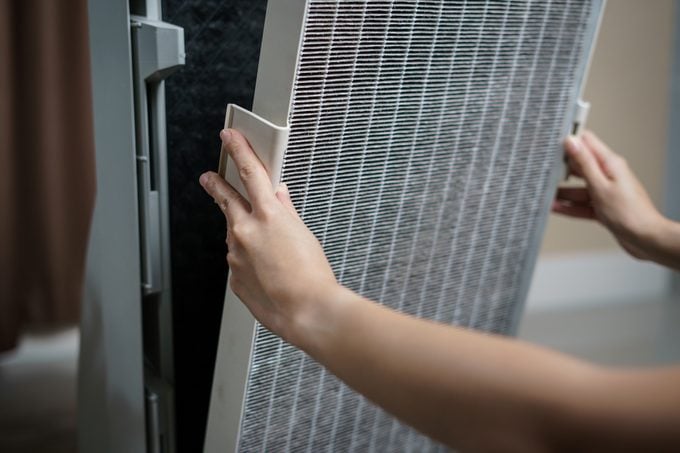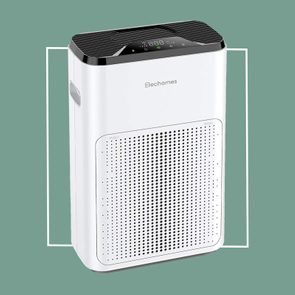What Is a HEPA Filter—and When Do You Need One?
Updated: Jul. 02, 2021
A high-efficiency particulate air (HEPA) filter can remove or trap allergens like pollen and mold and help you breathe easier.
What is a HEPA filter?
If seasonal or perennial allergies leave you or someone you love sniffing, sneezing, and wheezing, a high-efficiency particulate (HEPA) filter may help dial down the misery.
The air you breathe both in and outside of your home—and what’s floating in it—can have a major impact on your health and well being, especially if you have allergies or an underlying breathing disease.
You have particulate matter—pollen, dust mites, aerosols, mold, bacteria, and viruses—to thank for that. Fine particles, called PM 2.5, are 2.5 micrometers in size. That’s roughly 3 percent of the diameter of a piece of human hair.
These tiny particles can be easily inhaled, causing or worsening existing allergies and respiratory diseases.
To the rescue: HEPA air filters, which can remove from the air at least 99.97 percent of particles that are 0.3 microns in diameter, says E. Neil Schachter, MD, a professor of pulmonary, critical care, and sleep medicine at Mount Sinai Hospital in New York City and author of The Good Doctor’s Guide to Colds and Flu.
You’ll find HEPA filters in a lot of personal air purifiers, which clean indoor air by drawing air through the filter, Dr. Schachter explains.
Home air purifiers can be portable, so you can take them from room to room, or stationary. Prices range from around $30 to several hundred dollars, depending on the make, model, its capabilities, and any added bells or whistles.
(Need more assurance that they work? HEPA filters are one of the main ways doctors allergy-proof their homes.)
From top-secret government lab to your home
HEPA filters aren’t new, but they haven’t always been readily available for use in your home.
The first HEPA filter was developed in the 1940s under a classified government project, according to the National Air Filtration Association.
It’s goal? Filter radioactive contaminants as part of the Manhattan Project—you know, the project responsible for developing the atomic bomb.
The filters became declassified in the 1950s, and there have been many improvements in the design since then.

Do you need a HEPA filter?
Chances are, the answer is yes.
Pretty much anyone can benefit from running a HEPA filter. But smokers, people with allergies, and anyone with an advanced airway disease such as asthma or chronic obstructive pulmonary disease (COPD) will reap the biggest rewards because they’re particularly sensitive to air pollutants, Dr. Schachter says.
“As a pulmonologist, I recommend my patients, particularly those with allergies, asthma, and chronic obstructive pulmonary disease, use HEPA filter devices to clear the air in their homes,” he says. “These devices remove air pollutants that have been shown to be irritants and even carcinogens.”
That they’re used in portable air-purifying devices is a boon.
“If you are concerned about particulate exposure in your home, get a local HEPA air filter unit that you can move around to clean the air around you,” suggests Karin Pacheco, MD, an allergist and associate professor in the division of environmental and occupational health sciences at National Jewish in Denver.
Neeta Ogden, MD, an allergist and immunologist in Edison, New Jersey, and a spokesperson for the American College of Allergy, Asthma, and Immunology (ACAAI), is a fan too.
“I recommend a HEPA filter to most people with allergies and sensitivity to things in the air like cooking, scented candles things like that,” she says.
Do HEPA filters work?
There’s lots of research to back up the experts’ recommendations.
In one study, presented at the 2018 European Respiratory Society’s International Congress, HEPA filters used in the home significantly reduced fine particulate matter in the air compared with non-HEPA air filters.
When researchers monitored air quality for 12 weeks in the homes of individuals who had breathing difficulties, they found that the HEPA filters reduced fine particulate matter indoors by 55 percent and reduced the amount of outside particulate pollution coming inside by 23 percent.
It’s important to note that this was not published in a peer-reviewed journal, the gold-standard for ensuring a study’s accuracy. But it does suggest a promising role for these filters.
What’s more, recent research published in Otolaryngology-Head and Neck Surgery showed that portable HEPA filters can catch Covid-19 particles in your air much quicker and more effectively than non-HEPA filters.
How to shop for a HEPA filter
There isn’t a one-size-fits-all HEPA air filter. Choosing the right one depends largely on your budget, the size of your space, and what you are trying to filter out of the air that you breathe.
These are the best air purifiers for viruses, while these are the allergist-approved air purifiers for better air quality, and experts recommend these air purifiers for mold. Then there are top air purifiers for pets and air purifiers for viruses.
Before you buy just any old device, pay attention to the following details.
Read the label carefully
HEPA filters are regulated by the U.S. Department of Energy. “Those that do meet these standards should have it stated in their documentation on the box,” Dr. Schachter says.
Companies will try to fool you with marketing language, so stay alert.
“Beware of devices designated as HEPA type, HEPA like, and HEPA style,” Dr. Schachter says. “They do not deliver the same reliable level of cleaning as a HEPA-certified device. ”
Check the CADR
You’ll need to buy a filter to fit your room. Go too small, and your air purifier won’t properly clean your large room.
The manufacturer should provide the dimensions of the room that the filter can handle, Dr. Schachter says.
A clue as to whether a filter is sized right is the clean air delivery rate (CADR), which explains the cubic feet per minute of airflow through the device.
Check to see that the filter has a CADR that matches the size of the room where you plan to use it, he says.
Check the ACH
HEPA filters are rated on their air changes per hour (ACH).
“I recommend an ACH of six. That is to say, the device provides a complete exchange of all the air in the room per hour,” Dr. Schachter says.
Six is the highest possible ACH rating, and the fresher the air exchange, the cleaner that your air will be, he notes.
Check the MERVs
Keep an eye out for the Minimum Efficiency Reporting Values, or MERV. This rating will tell you how well the filter can trap bigger particles—those between 0.3 and 10 microns.
The higher the MERV rating, the better the filter is at trapping larger particles as well as the smaller ones, according to the Environmental Protection Agency.
Avoid ozone generators
Don’t waste your money on an ozone generator or ozone air purifier.
“These devices produce ozone gas and can make asthma worse and don’t do much for exposures,” Dr. Pacheco says.
Even low levels of ozone can cause chest pain, coughing, shortness of breath, and throat irritation, she says.
Replace HEPA filters periodically
HEPA filters do need to be replaced periodically.
Follow the manufacturer’s instructions. In general, most need to be replaced every six to 12 months.
Other ways to minimize indoor air allergens
HEPA filters can do a lot, but they are not miracle devices.
“They do not remove gases and odors. For those pollutants, you need a charcoal filter,” Dr. Schachter says.
Your best bet is combining a HEPA filter with other allergen-reducing methods.
Close your windows
Close all of your windows to keep pollen and other outdoor allergens out of your home, Dr. Ogden says.
Keep pets out of the bedroom
No matter how much you love them and want to cuddle with them at night, don’t let your dogs sleep in the bed.
All pets should stay out of the bedroom if you are allergic to pet dander, Dr. Ogden says.
Minimize clutter
Keep your bedside table free of clutter, and wipe down surfaces frequently to prevent dust and dust mite accumulation, she suggests.
If you or someone in your home is allergic to dust mites, follow this advice to get rid of dust mites.
Vacuum regularly with a HEPA-certified vacuum
If your vacuum doesn’t have a HEPA filter, it could release allergens back into the air, Dr. Pacheco says. These HEPA filter vacuums can help you clean your home without fear of an allergy attack.
Remove shoes indoors
Ask people to remove their shoes when they enter your home. This simple request can cut back on—and in some cases eliminate—the pollen, mold, or other outdoor allergens that are tracked into your home.
Get rid of mold
Taking care of leaks in bathrooms, basements, and areas where water accumulates will prevent mold from growing.
Got a mold allergy? Here are more expert-approved tips for getting mold out of your home.



















